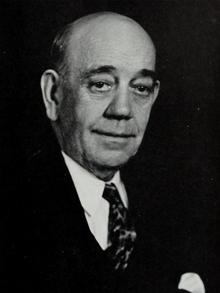Ruby Laffoon
Ruby Laffoon (* 15. January 1869 in Madisonville , Kentucky ; † 1. March 1941 ) was an American politician of the Democratic Party and from 1931 to 1935 Governor of the State of Kentucky.
Early years and advancement
Ruby Laffoon, whose uncle Polk Laffoon sat for Kentucky in the United States House of Representatives from 1885 to 1889 , attended local schools in his home country. He later studied law at Columbia Law School . He graduated from Washington and Lee University in 1890 . He then settled as a lawyer in Madisonville. In 1907 and 1912, he ran unsuccessfully for the office of Treasury Secretary of Kentucky. Between 1921 and 1931 he served as a judge at the Hopkins County District Court . In 1931 he was nominated by the Democrats as a candidate for the upcoming gubernatorial election. He won the election with 54.3% of the vote against Republican William B. Harrison , who got 45.4%.
Kentucky governor
Laffoons term began on December 8, 1931, ended on 10 December 1935. The problem those years was the Great Depression . Laffoon wanted to fight them with a tax increase, but sometimes met with strong opposition. In March 1933 he closed the banks for several days. This was decided at the time by Congress and US President Franklin D. Roosevelt and was successfully practiced in most states. During this time, the banks were reorganized and were able to reopen stronger. That was a major factor in saving many credit institutions. A restructuring of the administration is noteworthy, in particular the curtailment of the powers of the lieutenant governor . The then Lieutenant Governor Happy Chandler was one of the governor's sharpest critics. In total, Laffoon had pardoned 560 prisoners to relieve the prisons. This practice was not without controversy and was discussed controversially. It is also noteworthy that he named several celebrities from all over the USA to "Colonels of Kentucky", which corresponds to an honorary citizen. This included greats from all cultural areas, who then usually also advertised Kentucky. In addition, the governor promoted the expansion of the education system, as far as this was possible within the framework of the poor budget situation.
Another résumé
After his tenure ended in December 1935, Laffoon resumed his legal practice in Madisonville. But he remained connected to politics and his party. In 1936 he was a member of the Democratic National Committee for the 1940 Democratic National Convention in Chicago , where Franklin D. Roosevelt was nominated for the third time as a presidential candidate. Ruby Laffoon died on March 1, 1941 in Madisonville. He was married to Mary Nisbet, with whom he had three children.
Web links
- Ruby Laffoon in the National Governors Association (English)
- Ruby Laffoon in the database of Find a Grave (English)
| personal data | |
|---|---|
| SURNAME | Laffoon, Ruby |
| BRIEF DESCRIPTION | American politician |
| DATE OF BIRTH | January 15, 1869 |
| PLACE OF BIRTH | Madisonville , Kentucky |
| DATE OF DEATH | March 1, 1941 |
| Place of death | Madisonville , Kentucky |

